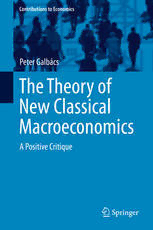
The Theory of New Classical Macroeconomics: A Positive Critique PDF
Preview The Theory of New Classical Macroeconomics: A Positive Critique
Contributions to Economics Peter Galbács The Theory of New Classical Macroeconomics A Positive Critique Contributions to Economics More information about this series at http://www.springer.com/series/1262 Peter Galba´cs The Theory of New Classical Macroeconomics A Positive Critique PeterGalba´cs BudapestBusinessSchool Miskolc Hungary CompletelyrevisededitionoftheoriginalHungarianeditionwiththetitle“Aktívszabályozás vagygazdaságpolitikainihilizmus?”publishedbyAkadémiaiKiad(cid:1)oZrt.,2012 ISSN1431-1933 ISSN2197-7178 (electronic) ContributionstoEconomics ISBN978-3-319-17577-5 ISBN978-3-319-17578-2 (eBook) DOI10.1007/978-3-319-17578-2 LibraryofCongressControlNumber:2015938182 SpringerChamHeidelbergNewYorkDordrechtLondon ©SpringerInternationalPublishingSwitzerland2015 Thisworkissubjecttocopyright.AllrightsarereservedbythePublisher,whetherthewholeorpartof the material is concerned, specifically the rights of translation, reprinting, reuse of illustrations, recitation, broadcasting, reproduction on microfilms or in any other physical way, and transmission or information storage and retrieval, electronic adaptation, computer software, or by similar or dissimilarmethodologynowknownorhereafterdeveloped. The use of general descriptive names, registered names, trademarks, service marks, etc. in this publicationdoesnotimply,evenintheabsenceofaspecificstatement,thatsuchnamesareexempt fromtherelevantprotectivelawsandregulationsandthereforefreeforgeneraluse. Thepublisher,theauthorsandtheeditorsaresafetoassumethattheadviceandinformationinthis book are believed to be true and accurate at the date of publication. Neither the publisher nor the authors or the editors give a warranty, express or implied, with respect to the material contained hereinorforanyerrorsoromissionsthatmayhavebeenmade. Printedonacid-freepaper Springer International Publishing AG Switzerland is part of Springer Science+Business Media (www.springer.com) To the memory of Andra(cid:1)s Vigva(cid:1)ri. ThiSisaFMBlankPage Foreword Peter Galba´cs, a former student of mine, offered me the privilege to write a brief introductiontohisworkonTheTheoryofNewClassicalMacroeconomics. PeterGalba´cs’bookisanexcitingandchallengingworkthatinduceseventhose readers who are well educated in—and sometimes indoctrinated by—mainstream macroeconomics to rethink and revise some of the fundamental ideas of our profession. I would not pretend that I agreed with all parts of his analysis and conclusions, but this is exactly why Galba´cs’ book is so useful and interesting. It would have been tiresome and boring to read a text which triggers only “I agree” types of reactions. Galba´cs’ work is like a huge canvas: it offers an elegant, colorful, and complex picture of the different schools of macroeconomic theory. His main conclusion that the neoclassical theory of economics is still alive and it provides a good framework of analysis and economic policy is well supported by theauthor’sreasoninginthetext.Iwouldliketoencouragetheauthortopursuethis lineofresearchinthefuture.Andlastbutnotleast,Iamreallyproudofthefactthat Icouldbeoneofhisprofessors. Budapest,Hungary IvanMajor vii ThiSisaFMBlankPage Preface Findingtheblackcatisnotrewarded. (NormanDavies:Europe–AHistory.Foreword,PolishEdition) My career as a researcher started under the spell of Keynes. I took a sincere interest in the ultimate questions of economic theory relatively early, surprising evenmyself.Attendinglecturesonsociologyandsocialphilosophyatthefacultyof humanitiesandsocialsciences,Ialmostranawayfromthephilosophylectures.The lack of firm answers and the different systems of thoughts contradicting and overwriting each other were too disturbing and what is more even frustrating for me.So,myinterestturnedtoeconomicsociologyfirstandthentoeconomicsitself, hopingtofindadisciplinedsciencebuiltonmathematics.Ididbelievethatschools ofeconomicthoughtscouldharmonizeinthemostfundamentalquestionsandhave only minor differences in their opinions. I could hardly realize that economic theories suffer the same confusion. Moreover, having been armed with lectures given by Endre Nagy, Mikl(cid:1)os Mar(cid:1)oth, and Gy€orgy Mikl(cid:1)os, all these impressions madeitobviousandnearlyinevitablethatmyinterestasaneconomistwouldturnto economictheoryandtothephilosophyofeconomics.Today,Iknowthateconomic theory for me, due to these early experiences, has become a thesaurus of philo- sophical texts describing the economic aspects of processes going on in societies. Ofcourse,itis trueaswell thatIrealized only asaneconomistthatthequestions raised by a branch of science itself cannot be answered on the grounds of its methodology and theory. If we want to consider the objects and methods of economics,thetheoryofmarginalutilitydoesnothelpustoomuch. I made myself familiar with Keynes’ theory as an undergraduate student. Fortunately, my first attempts were helped and controlled by professors who requiredmetostudythemostimportant textsinthehistoryofeconomicthoughts veryyoung.TheimpactthatKeynesexertedonmewashuge,since,ononehand,I couldbecomenotonlyacquaintedwiththeprinciplesthathadgovernedoperative economic policy for decades but also got an insight into the most significant and mostextensivetheoreticaldebateofeconomicsofthetwentiethcentury.Myearly interest was mainly focused on the points on which Keynes was opposed to the ix
